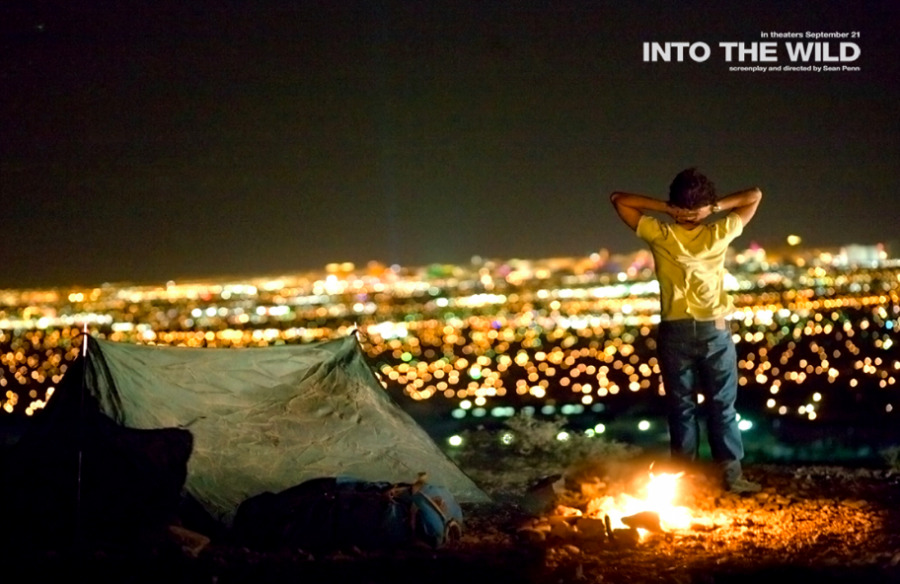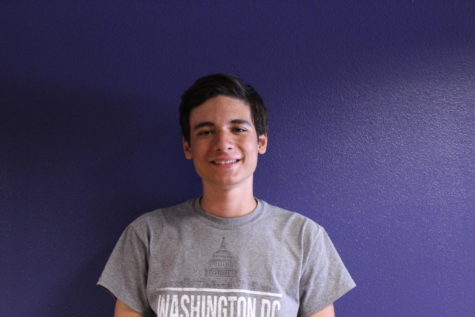Review of Into the Wild: beliefs taken to the extreme
January 18, 2021
This is a review of the movie adaptation Into The Wild written by Jon Krakauer. It contains spoilers and discusses different perspectives on how Christopher McCandless’s story can be interpreted.
Normal text indicates Editor-in-Chief Jane McCauley. Bold text indicates Opinions Editor Giovanni Machado.
Jane McCauley: After watching the film, I realized how relevant Supertramp’s story was to what I, and probably many others, had been feeling this past year – confused, isolated, and lost. The movie also made me think about the experiences that I could have had during my last years of high school and how someone with everything chose to have nothing. A young man, Chris McCandless, later known as Alexander Supertramp, has his entire life set out in front of him after graduating from Emory University but throws it all away to become a homeless, wandering hippie.
He survives near-death experiences all over the west coast for years and meets these amazing people who care for him like family. But Chris chooses to continuously walk away from everything he stumbles upon and ends up withering away and starving in the Alaskan wilderness from unknowingly eating poisonous potato roots to survive.
I do believe that the guy is kind of an idiot for walking out of his comfortable lifestyle to go “explore” and “find himself in nature” without knowing, or really caring if he dies, and his story horribly inspires others to do the same after his death. But I do also think that his story is a good representation that people can try to escape from society and their problems, but they will always unintentionally meet people along the way who shape them and force them to think differently.
Giovanni Machado: I completely agree with the last point, that people can indeed influence their surroundings even if unintentionally, and that people should be able to escape their problems if they feel like it. However, my main problem is that his motives are far from enough for doing what he did. His motives are basically “society is horrible and I’m a bastard, therefore, love isn’t real,” like, what?
His escape couldn’t be more selfish. His journey could be compared to the ones of Buddha or Che Guevara (not comparing these two historical figures) from the perspective that they were also two men who had it all but decided to leave everything behind to try to make people’s lives better. That’s not Christopher’s goal.
He doesn’t give any explanation whatsoever to his family or anyone close to him as to why he is doing this.
Also, despite his dad being portrayed as distant and oftentimes aggressive, those problems are far more enhanced in the movie than they were in the book. The book is written primarily based on the story that people around Christopher told the author, so of course, his family wouldn’t be 100% explicit if domestic violence was a thing in Christopher’s childhood, but I believe we have to work with what we got.
In one of the very first scenes of the movie his parents tell him they are going to give him a new car as his graduation present, which he clearly doesn’t want. The problem is, instead of just saying something along the lines of “thank you very much for the offer, but you don’t have to, you’re already paying for my college education and that’s enough,” he explodes and rants about how materialistic society is. Like, c’mon dude, your parents just offered you a car, they are not holding a gun to your head. He clearly doesn’t understand how good he has it, which leads to him ultimately escaping from society. So do you see how his motives are almost nonexistent?
JM: I don’t disagree with you that his motives are more selfish and probably even egotistical, but I don’t believe he left solely because he was a spoiled brat that felt guilty because he had more material wealth than the average person. He was so lost and confused with his family and himself that he probably couldn’t have even survived having a normal life if he wanted to. He was so distressed about everything that he had to run away and escape, just to try and make sense of things in any way he could. Although, that brings me to the idea that he always had a doomed fate because trying to survive in only nature, using her as his friend, family, and as an extension of himself, didn’t let him win either.
Throughout the book and film, Chris made many references to authors who influenced him strongly like Henry Thoreau, a naturalist and philosopher who believed people could find themselves within the spirituality of nature. These ideas and philosophies are the cogs throughout history that keep people thinking and challenge them to be better individuals, but Chris took these ideas to the extreme and used them in ways that the authors never intended them to be used.
In my opinion, most of the authors that inspired Chris were expressing that you could use nature to help you figure out who you are and what your purpose is, but they never meant to say that you have to completely dissociate from society. Chris was so consumed with the thought that there was something bigger than him, controlling him, that he decided to run from it rather than face it. Unfortunately, he misinterpreted these ideas to the extent that he became disillusioned. He was frantically seeking the idea that life was about becoming enlightened and surviving in the wild and proving that individuals don’t need people or things at all to do so. In a way, he was right. Of course, people don’t need other people or material things to survive. But what he forgot to remember is that people also need human contact in order to learn and grow from each other to continue evolving and becoming something better, which is why he eventually died, alone.
GM: I see how maybe he had the right ideas, but perhaps the wrong method. But the thing for me is that I’m not even sure he’s got the right idea at heart. As you said he completely misinterprets the authors he read, and seems to be going through a phase of “society is all wrong, and people are stupid,” but given the situation he is in, he chooses the worst possible solution to these thoughts that everyone has when they are fifteen or something.
While he could’ve studied law in an Ivy League school and perhaps try to become a politician to change society, he disregards everything and everyone around him and decides to do his own thing, doesn’t matter how many people he needs to hurt and traumatize in the process, society is stupid, so why should he care? And even though I think he should not go to college if he doesn’t feel like it, all of his anger is misdirected to his family and society, which leads him to make an idiotic decision of leaving it all behind.
Blaming everything in “society” is such a childish thought. I’m sure everyone went through this phase when they were fifteen or something, but it usually doesn’t last longer than five months or so. In this case, we’re talking about a fully grown man which makes this a hundred times worse. His disregard for those around him doesn’t come out only as selfish but cruel most of the time.
The impact he has on Mr. Frank’s life, a man who’s lost his wife and son in a car crash and now lives alone, is so touching and beautiful, that it makes me almost hate Christopher and his decision to leave him to go die in Alaska. Of course, he didn’t plan to die, but you can’t just put yourself in the life of this lonely old man and bring him joy just to strip it away weeks later. He gave a lonely old man hope that he wouldn’t be alone anymore, just to die alone himself, and thus making Mr. Frank alone once again.
When Mr. Frank dies, he doesn’t only die alone, but his family-line dies with him since his biological son passed away with his wife in a car crash and Christopher refused to be adopted by him. It is cruel to give someone this kind of hope just to take it away, and I can’t feel any kind of sympathy towards Christopher McCandless, his journey, or his legacy.
JM: See, this is where I start to think that’s not the whole story. Chris definitely gives this poor man false hope that he could be his surrogate son, but the way I interpret it, Chris also forced Frank to truly believe that he could finally have a life even after he lost his wife and son. Chris pushed Frank to understand that he could continue living and exploring life on his own and that it wasn’t selfish just because he was doing it without his family.
Chris is able to do the same thing for many of the people he meet, and throughout his journey, it was almost as if Chris was trying to help fix these people, their problems, and their relationships and show them that there’s more to life than just being alone – which is so ironic because that was the one thing Chris was running from the entire time.
It’s what makes Chris so hypocritical.
He was trying to prove to every person he met along the way that relationships are what makes life worth living for, but he was so afraid of having them himself that it was easier to tell others what to do and be alone himself, even though deep down, I think that’s what he truly wanted.
GM: I agree that most people he encounters have their life changed in a good way, but I still can’t get over what he did to Mr. Frank, and I think that shows how all the good he did was far from intentional. People sometimes just need a wake-up call, and if that is having a homeless man entering their lives, so be it. Mr. Frank, however, renounces his religion when he hears the news of Christopher’s death. Not saying that being an atheist is a bad thing, but for most people to lose their faith and religion, it takes a very traumatic event in their lives, so if it wasn’t enough having his family killed in a car crash, Christopher traumatizes this old man once again leaving, in my opinion, no good influences in his life whatsoever.
We’ve agreed that he’s selfish, but I still don’t think that the good he’s done was intentional, or outweighs the wrongs he’s done.
JM: Well, agree to disagree I guess, but both the film and the book propose interesting perspectives on how people can choose to live their lives and have relationships with family and the people they meet during their adventures.
Personally, I mostly agree with you that Supertramp’s execution of how to deal with the darkness of the world and life was disappointing and sad, and his wasted potential could have been truly inspirational. But I believe everyone can agree that his story is a unique cautionary tale on what could happen if people take ideas to the extreme.





















